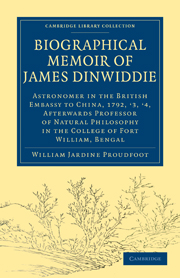 Biographical Memoir of James Dinwiddie, L.L.D., Astronomer in the British Embassy to China, 1792, '3, '4,
Biographical Memoir of James Dinwiddie, L.L.D., Astronomer in the British Embassy to China, 1792, '3, '4, Book contents
- Frontmatter
- TO THE READER
- Contents
- CHAP. I BIRTH, EARLY LIFE, AND A TEACHER OF YOUTH
- CHAP. II CAREER AS A PUBLIC LECTURER ON NATURAL PHILOSOPHY
- CHAP. III APPOINTMENT IN THE BRITISH EMBASSY TO CHINA—VOYAGE TO AND ARRIVAL AT PEKIN
- CHAP. IV RESIDENCE AT PEKIN
- CHAP. V DEPARTURE FROM PEKIN AND JOURNEY TO CANTON
- CHAP. VI RESIDENCE IN CANTON
- CHAP. VII TERMINATION OF THE EMBASSY—VOYAGE TO AND ARRIVAL IN INDIA
- CHAP. VIII RESIDENCE IN INDIA, AND APPOINTMENT AS PROFESSOR OF NATURAL PHILOSOPHY IN THE COLLEGE OF FORT WILLIAM
- CHAP. IX RETURN TO ENGLAND—DEATH
- LETTERS
CHAP. II - CAREER AS A PUBLIC LECTURER ON NATURAL PHILOSOPHY
Published online by Cambridge University Press: 05 October 2010
- Frontmatter
- TO THE READER
- Contents
- CHAP. I BIRTH, EARLY LIFE, AND A TEACHER OF YOUTH
- CHAP. II CAREER AS A PUBLIC LECTURER ON NATURAL PHILOSOPHY
- CHAP. III APPOINTMENT IN THE BRITISH EMBASSY TO CHINA—VOYAGE TO AND ARRIVAL AT PEKIN
- CHAP. IV RESIDENCE AT PEKIN
- CHAP. V DEPARTURE FROM PEKIN AND JOURNEY TO CANTON
- CHAP. VI RESIDENCE IN CANTON
- CHAP. VII TERMINATION OF THE EMBASSY—VOYAGE TO AND ARRIVAL IN INDIA
- CHAP. VIII RESIDENCE IN INDIA, AND APPOINTMENT AS PROFESSOR OF NATURAL PHILOSOPHY IN THE COLLEGE OF FORT WILLIAM
- CHAP. IX RETURN TO ENGLAND—DEATH
- LETTERS
Summary
In February, 1778, the University of Edinburgh conferred on Mr. Dinwiddie the distinction of Master of Arts. His passion, however, for philosophical studies had by this time involved him in embarrassment. The first cost of his apparatus plunged him at once into a debt of one hundred and fifty pounds, to pay off which the only scheme, that carried probability of success, was that of giving public lectures. The indulgence of the magistrates and council of Dumfries enabled him to put this into execution, and the approbation of his friends encouraged him to go on. Among the list of Mr. Dinwiddie's approvers occurs the name of Professor Dugald Stewart, who writes him an invitation to give them some instruction in Ayr. Leave of absence was asked but for a limited period, as he still retained the control of the academy, where he placed an assistant to take the immediate charge till his return. Thus prepared, he set out, in the summer of 1778, to amuse the learned, and instruct those who do not fall under this denomination, by a set of lectures on natural philosophy, assisted by a powerful train of experiments.
Bending his steps to the north, his expectations were fully realised, particularly at Edinburgh, Leith, and Dundee. In the spring of the following year he made a successful tour through Galloway, and, contrary to advice received from most respectable authority, as a peculiarly unfortunate period, passed over into Ireland, on the 18th July.
- Type
- Chapter
- Information
- Biographical Memoir of James Dinwiddie, L.L.D., Astronomer in the British Embassy to China, 1792, '3, '4,Afterwards Professor of Natural Philosophy in the College of Fort William, Bengal, pp. 3 - 26Publisher: Cambridge University PressPrint publication year: 2010First published in: 1868
